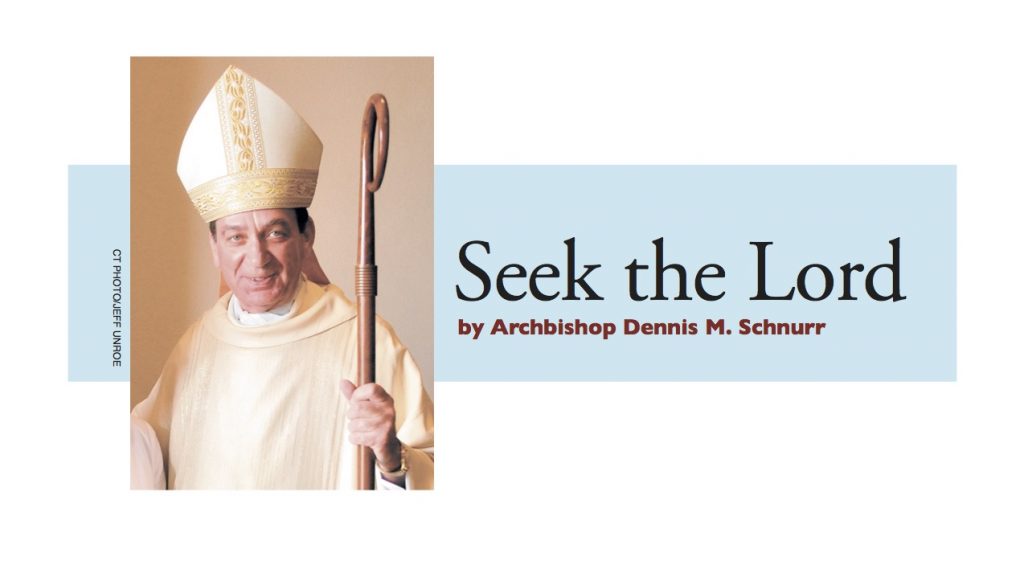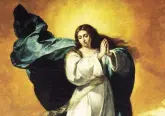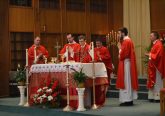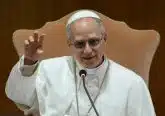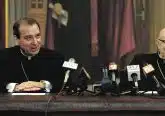Being a Catholic and a citizen
Archbishop Dennis M. Schnurr’s column for July
The Declaration of Independence, which we celebrate on July 4, declares the rights of life, liberty, and the pursuit of happiness to be God-given and therefore “unalienable.” Catholic social justice teaching agrees. These are not only civil rights, but human rights.
The Church also recognizes that with these rights come responsibilities, including the responsibility to act for the common good as conscientious citizens of our country and our local community.
This spring brought another election season marred by a great degree of negativity and incivility. In this discouraging environment, it can be tempting to opt out of voting and other aspects of political life. As Catholics, we should do just the opposite. Our civic engagement is needed now more than ever to bring salt and light (Mt 5:13-16) to the political process.
“In the Catholic Tradition, responsible citizenship is a virtue, and participation in political life is a moral obligation,” the Catholic bishops of the United States noted in their 2015 document “Forming Consciences for Faithful Citizenship.”
“Unfortunately, politics in our country often can be a contest of powerful interests, partisan attacks, sound bites, and media hype. The Church calls for a different kind of political engagement: one shaped by the moral convictions of well-formed consciences and focused on the dignity of every human being, the pursuit of the common good, and the protection of the weak and the vulnerable. As Pope Francis reminds us, ‘Politics, though often denigrated, remains a lofty vocation and one of the highest forms of charity, inasmuch as it seeks the common good.’”
And the Church teaches that politics is not just for politicians. “As far as possible citizens should take an active part in public life,” the Catechism of the Catholic Church teaches (no. 1915). That means not only voting but also studying issues and candidates, keeping in mind that Catholics have no permanent home in any political party.
There is something else we should do as Catholic citizens: pray for our leaders. St. Paul urged “that supplications, prayers, petitions and thanksgivings be offered to everyone, for kings and for all in authority, that we may lead a quiet and a tranquil life in all devotion and dignity” (1 Tim 2:1-2).
In response to this biblical injunction, Archbishop John Carroll of Baltimore wrote a prayer on Nov. 10, 1791 that was to be read in the parishes of his diocese. He was the first Catholic bishop in the United States and a cousin of Charles Carroll, the only Catholic signer of the Declaration of Independence. In part, Archbishop Carroll’s prayer read:
“We pray, O God of might, wisdom and justice, through whom authority is rightly administered, laws are enacted, and judgment decreed, assist with your Holy Spirit of counsel and fortitude the president of these United States, that his administration
may be conducted in righteousness and be
eminently useful to your people over whom
he presides. …”
Archbishop Carroll also asked that divine wisdom “direct the deliberations of Congress, and shine forth in all the prceedings and laws framed for our rule and government, so that they may tend to the preservation of peace, the promotion of national happiness, the increase of industry, sobriety and useful knowledge; and may perpetuate to us the blessing of equal liberty.”
And he prayed “for his excellency, the governor of this state, for the members of the assembly, for all judges, magistrates, and other officers who are appointed to guard our political welfare, that they may be enabled, by your powerful protection, to discharge the duties of their respective stations with honesty and ability.”
Let us make Archbishop Carroll’s prayer our own, for it is still relevant today.










